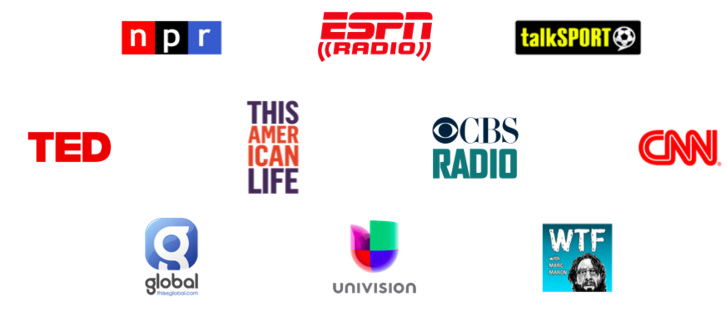
In many ways, radio has been the neglected stepchild of the Internet age, but that’s starting to change. Print news organizations were among the first companies to offer their content online, followed by video content from TV news outlets, the multitude of contributors to YouTube and, later, movie and TV shows streamed on Hulu, Netflix, Amazon Prime and other services.
Of course, audio has been online for a long time. I remember when RealNetworks founder Rob Glaser introduced his company’s audio streaming service back in 1994.
But, for years, starting in 1998, the dominant source of online music and audio programming came from Apple’s iTunes, which isn’t a streaming service. Users had to download their audio files to play on computers or iPods and later on iPhones and iPads. Last year Apple finally launched its music streaming service, Apple Music after acquiring Beats Music.
Now live streaming of music is mainstream with the likes of Spotify, Pandora and Apple Music becoming increasingly popular. In the meantime, we’re starting to see progress when it comes to news, talk, audio books and podcasts.
Podcasts have been around since about 2004. I started podcasting in 2005, first for IT Conversations, which is no longer active, and now for CBS Radio News.
In 2014 the public radio show “This American Life” launched the first wildly successful audio podcast called “Serial,” which is now in its second season with a weekly series that explores the case of Sgt. Bowe Bergdahl, the soldier who wandered away from his base in Afghanistan to be captured and held prisoner by the Taliban and is now facing a court martial. “Serial” is available directly from its own website (serialpodcast.org) as well as Pandora.
One of the things that has made podcasting and streaming so popular is that it is now relatively easy to listen to streaming audio when walking or running, at the gym or driving your car. I have an expensive infotainment (AM/FM/CD and GPS) system in my car, installed about five years ago, but aside from listening to radio, the only thing I use it for is to connect my smartphone via Bluetooth so that I can listen to music and podcasts while I drive. Until a few years ago those audio files were mostly stored on the phone, but mobile 4G broadband is now ubiquitous and affordable enough to stream audio from most areas of the country — certainly from most major highways. It’s clearly the way of the future. At CES, Ford, GM and most other automakers showed off car audio systems that relied mostly on Android Auto and Apple CarPlay, rather than just their own homegrown services.
While audio does impact your data plan, it’s not nearly as data hungry as video.
According to Verizon’s data calculator, if you listen to a full hour of streaming audio a day, you’ll use about 1.8 gigabytes a month, but that can vary depending upon the quality level of the audio. If your data cap is an issue, some apps, including Spotfiy, allow paid subscribers to download music when connected via Wi-Fi to listen to offline.
There has been news lately from the world of streaming. On Christmas Eve, as kind of a gift to the world, the Beatles started streaming on Apple Music, Spotify, Google Play, Amazon Prime and other services. That was a big deal. It wasn’t until 2010 that Beatles music was available to download on iTunes as one of the last major accomplishments of Apple founder Steve Jobs, who died less than a year after he made that announcement.
Also on the music front, SoundCloud just announced a licensing deal with Universal Music that will enable the service to stream songs from the label’s vast catalog of music including the work of U2, Kanye West, M&M’s, Lady Gaga and other artists.
SoundCloud had earlier reached a deal with Warner Music and as well as Merlin, which represents independent labels, the National Music Publishers Association and PRS, the agency representing British songwriters. SoundCloud reportedly plans to introduce a paid music subscription service later this year to complete with the likes of Spotify and Apple Music.
SoundCloud is like YouTube for audio. Like many broadcasters and podcasters, I use it to post my daily Tech Talk CBS Radio News segments (https://soundcloud.com/cbs-radio-news).
Both uploading and listening are incredibly easy. But, like YouTube, anyone can post to SoundCloud. You can post up to three hours of audio for free, six hours for $7 a month or unlimited audio for $15 a month with a 32 percent discount for an annual plan.
TuneIn also made a big announcement. The audio service is now streaming NFL postseason games including divisional playoffs, conference championships, Pro Bowl and the Super Bowl.
TuneIn is a leading streaming service with more than 45,000 audio books, 600 commercial free radio stations, sports content from both NFL and the Major League Baseball and plenty of news and information content from National Public Radio, Bloomberg, Fox and CBS News among others. TuneIn also covers the presidential debates.
As a radio guy, I’m thrilled to see audio — especially news and information — take its proper place in the online world. It represents a great resource for listeners along with opportunities and challenges for broadcasters and podcasters who now have more ways to distribute their content along with more competitors for listeners’ attention.